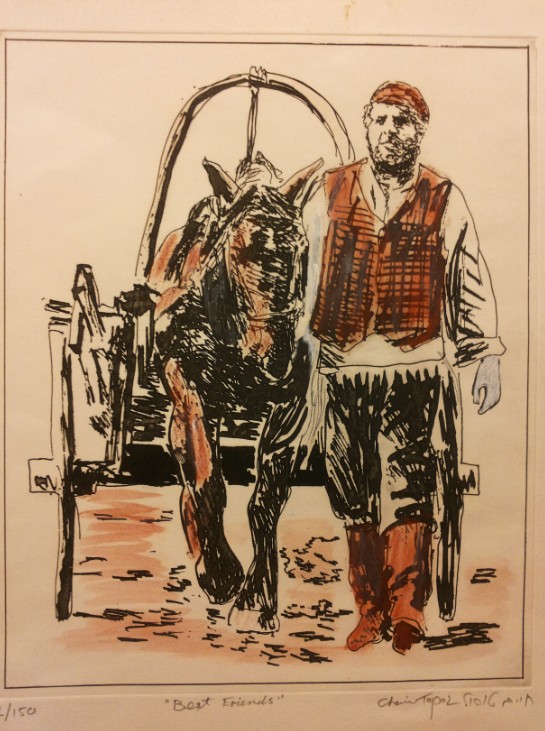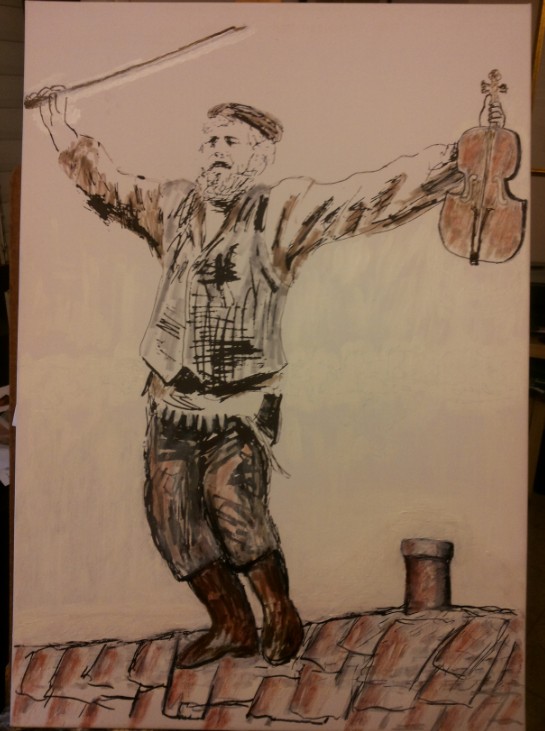Chaim Topol: "Fortunately, the Jewish People are a Good People"
About four years ago, the Jordan River Village opened in the Lower Galilee, allowing children with chronic illnesses to enjoy a dream vacation at no cost. The village spans 245 dunams, with most staff and doctors volunteering. Actor Chaim Topol, the man behind the initiative, says in an interview: "We've become the flagship camp worldwide; everyone envies us." Have we already said how fortunate Israel is?

In the days leading up to Tu Bishvat, the Lower Galilee is in its full glory. The hills are covered in green, and the streams flow into the Sea of Galilee. Amid all this pastoral scenery, somewhere at the end of Givat Avni, a village about a quarter-hour from Tiberias, lies the Jordan River Village. From afar, it looks like just another amusement park. But here? Almost in the middle of nowhere, who sets up an amusement park? It's not an amusement park, but it does have many amusements for children suffering from persistent illnesses. Believe it or not: everything is done for free, with no costs, and most of the workers come without any compensation other than the satisfaction of giving. The man behind the establishment of the village, the actor Chaim Topol, says in an interview: "I am very grateful to all the people who donate and volunteer; indeed, there's no one like them."
Born in 1935, Topol is not only an actor known for his iconic roles in Israeli cinema but also a father to three children and a grandfather to nine grandchildren. He regularly visits the village at least once a week to speak with the children and ensure everything is functioning as it should in the massive initiative he started about four years ago. The village spans 245 dunams of breathtaking views and includes accommodation, amusement facilities, art rooms, and even a mini hospital.
 Tevye the Milkman (Illustration: Chaim Topol)
Tevye the Milkman (Illustration: Chaim Topol)How was the idea born?
"From something unintended came intention. In 1967, before the Six-Day War, I was in London acting on stage. While there was complete despair here, the military attaché in London, Major General Tzvika Zamir, called me and said, 'Topol, we need you urgently.' I went to the embassy, and he showed me a telegram requesting to send as many ambulances as possible. I asked him bewilderedly, 'Okay, what do you want from me?' He told me they found 48 ambulances in Ford's backyard; however, they were sold to a children's charity organization, Variety, which is an artists' organization, so they're recruiting you to check if we can purchase them. I started making calls and learned there were good Jews in this organization. I met with them and showed them the telegram, and they replied that it's an organization that deals with children, donated by various non-Jews, so it's inappropriate to send ambulances to Israel from their funds." At this point, a brilliant idea emerged. The two suggested Topol establish a branch of Variety in Israel. "We'll ensure the ambulances are sent, and you can do with them as you please," they said. "We shook hands, and before you could say Jack Robinson, the war broke out. I went back to Israel, and luckily, when I returned to London six days later, they accepted me back into the play. In the dressing room, those two Jews were waiting for me. They reminded me of the promise to establish a branch in the country. We opened diaries, set a date, and that's how Variety was established," not before those dear Jews pledged to raise funds from the Jews of Britain. "Today, this organization is a magnificent entity, and many have joined it. Until then, I wasn't involved in activities related to children, but from that day, I'm bound to children."
Topol served as an international ambassador for the global Variety organization, during which he performed at special evenings held for the organization. "One day, I met actor Paul Newman at one of the meetings of children's organizations. He took me to see a camp he built for children in Connecticut, and I really liked it. I told him I'd consult with the directors of children's hospitals in Israel (Dana, Schneider, and Hadassah), and indeed they said it was a good idea." From that moment, the project began to take shape. The doctors wrote a program, and Topol raised the funds.
In 2011, the village opened and operates all year round. It's a village that operates on an existing model in 18 different villages around the world. "Unlike the camps in the USA, which operate only in the summer, we operate all year. We started cautiously, with awe and trembling, and today we have 42 vacation cycles." The village is visited by children who have been through a medical committee that found them fit for the vacation. It's worth mentioning that they come from all social strata without any difference. "The committee is the backbone of the village, without which no decisions are made. It's the heart of the village, where a very serious medical center operates. Fortunately, the Jewish people are a good people, and all the doctors and most nurses perform their duties voluntarily. Out of 110 village employees, we pay 16 salaries, and these are for designated roles. We've become the flagship camp, so all camps worldwide envy us. Understand, expert doctors come here doing everything on a completely voluntary basis, without getting a dime. Thank God we have an excellent team and a wonderful CEO."
 Fiddler on the Roof (Illustration: Chaim Topol)
Fiddler on the Roof (Illustration: Chaim Topol)How does it work? And who can come? Members of the medical committee discuss participants' cases four months before the session, which ranges from three to seven days. The staff examines, for example, whether the child can separate from their parents. "Each cycle is dedicated to a specific illness, allowing us to bring specialist doctors for that illness," says Topol, "for example, if we get children with juvenile diabetes, we bring specialist doctors and nurses for the field."
The stay in the village doesn't cost the children anything, as well as the weekends for families who sometimes accompany them. "There are children who come with their families," says Topol, "we have 96 beds, and we allocate rooms so they can come with their healthy children too."
Topol has a genuinely sensitive heart. When he talks about the village, his eyes sparkle. When he sees the children, his heart aches. It pains him, but he doesn’t show it on the outside. "I come once or twice a week to the village, meet with the children, and talk to them. Afterwards, I cry, without them seeing of course." When moving to talk about art and creativity, one of the requested questions is about his character in "Sallah Shabati," a character that represented the Mizrahis in the country, during the 1950s. "That's a classic," says Topol, "recently it was the 50-year anniversary of 'Sallah Shabati' and 'Fiddler on the Roof.' In the USA, it was noted. I started the character of Sallah back in 1955 with the Nahal Group, when his character was in skits. Then I continued with the character to 'Batzal Yarok' and the film. Following 'Sallah Shabati,' I got the role in 'Fiddler on the Roof.' In London, they were sure I was an older man, and when I came for the audition, they saw a 30-year-old boy."
Topol is fond of painting and also studies Gemara once a week. "Indeed, my hobby is painting, and I study *Gemara* once a week for 45 years, on Thursdays. I studied at Tachkemoni School in Tel Aviv and had an extraordinary teacher for Talmud. He was an excellent Talmud teacher. After the army, I went back to studying Talmud."
Can you say you've completed the Shas?
"There are tractates I've completed more than twice, but there are parts I haven't covered. I study with partners who are a hundred times better than me."
Are there other commandments you observe?
"I put on *tefillin* once or twice a week."
Topol derives great satisfaction from the volunteer initiative with the children. When he talks about the place, his eyes shine.
What's next in the field of art?
"I respond to various offers in the field of art, and I evaluate them. Although in the field in which I am involved, until the curtain rises, it's not considered a done deal. I finished writing a script. I'm translating a play, painting, and writing a play."

